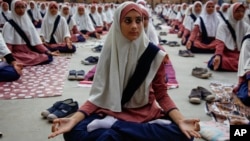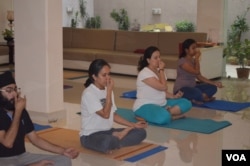This Sunday, India will organize yoga sessions in 192 countries after the United Nations agreed to Prime Minister Narendra Modi’s suggestion to observe June 21 as International Yoga Day.
The government wants to project yoga as India’s gift to the world, but controversies have dogged the mega event as some Muslim groups decry it as an effort to promote a Hindu nationalist agenda.
Embracing yoga
When Arun Pandala began conducting three yoga classes a week in 2004 in the business hub of Gurgaon near New Delhi, yoga was not mainstream. That has changed dramatically over the past decade and the Sivananda Yoga Center he co-founded now runs 14 classes a day.
Pandala, who embraced yoga after quitting his high pressure advertising and marketing job, is not surprised at the growing band of yoga practitioners in India and some Western countries.
“It’s very stressful to be living in our modern cities. So what’s happened is that people are looking for an alternative to reduce stress and also generally work on health,” Pandala said.
That is how the government wants to showcase yoga when nearly 35,000 senior leaders, soldiers, students and others stretch and bend along Rajpath, a colonial-era boulevard in New Delhi Sunday, as an ancient Indian practice that promotes well-being.
It also wants to reclaim yoga and have the world view it as part of the country’s rich cultural heritage as it spearheads celebrations across the world for the first-ever World Yoga Day.
Path to peace
Foreign Minister Sushma Swaraj said India’s objective in promoting yoga is to guide a conflict-ridden world on the path to peace.
Swaraj said yoga is a big soft power that India can use to bring the world together and end the increasing trend of violence.
Prime Minister Modi, who begins his daily routine with a 20-minute session of yoga and meditation, has been enthusiastically pushing yoga since he took office last year.
He has put trainers in government offices and is asking officials to shape up with yoga. He appointed a separate minister for yoga and urged schools to embrace the practice. Police officers and soldiers are also taking yoga lessons.
However, these efforts have raised the ire of some Muslim groups, who decry it as yet another ploy to promote the Hindu religion in a country that has 180 million Muslims.
These groups say the sun salutation or “surya namaskar,” which is part of most yoga drills, violates Islam because it involves bowing to the sun, whereas Muslims bow only to Allah.
Controversy
Yogi Adityanath, a controversial lawmaker of the Bharatiya Janata Party, added to the controversy when he said those who objected to surya namaskar should go jump in the sea – but the government quickly distanced itself from such comments.
Organizers quietly dropped the sun salutation from Sunday’s mega event, ostensibly because it is a difficult pose.
They urged Muslims to take part in the celebrations, but said there will be no pressure on anyone to join in.
That has not satisfied Abdul Rahim Qureshi, the assistant Secretary-General of the All India Muslim Personal Law Board.
Qureshi said many of the “asanas,” or exercises, in yoga start with chanting "hari om" or "om," a Hindu chant. He said some “shloka,” a song from Hindu texts, has to be chanted.
He called this a propagation of Hindu religion and said if the only aim is to exercise, you can do any exercise.
Officials counter such criticism by pointing out the mega event has the backing of 47 Muslim countries who have co-sponsored World Yoga Day.
'Om' chant
Qureshi said those countries probably do not know what the “om” chant or sun salutation mean.
The controversy has not come as a surprise, as Muslims have voiced suspicions about Modi’s Bharatiya Janata Party and accuse its ideological parent, the Rashtriya Swayamsevak Sangh (RSS), of pushing an agenda to change India from a secular to a Hindu country.
However, not all Muslims are opposed to yoga.
Farhat Aziz, principal of the Fatehpuri Muslim Senior Secondary School in a Muslim-dominated area in Delhi, said yoga has been a part of their physical curriculum for over 20 years. However, the chanting of “om” has been omitted.
Aziz said all students attend the class, although it is optional. He shrugs aside the recent heated exchanges over yoga, pointing out that it benefits his students.
He said there are political factors that create a controversy, but his school has nothing to do with the recent debate.
Taken aback
Many proponents of yoga have been taken aback by the objections voiced by Muslim groups.
Arun Pandala of the Sivananda Yoga Center said although yoga is culturally enmeshed in the Indian ethos and Hindu way of life, its physical practices have no religious connotation.
“There is no Hindu element involved in that at all, because you are practicing some physical exercises, some breathing techniques, some relaxation, and that could be taught to anyone, anywhere in the world," Pandala said.
"It is a little bit like karate or tai chi or kung fu. You don’t have to change your religion to practice these forms of martial arts. If you eat Chinese food, it does not make you Chinese, if you eat Italian food, it does not make you Italian,” Pandala added.
For most yoga practitioners, like Sudiksha Sinha, yoga is simply a form of exercise that helps different people in different ways.
Sinha said she wakes up to attend an early morning class three to four times a week.
“My daily routine has changed, my thoughts have changed, I really look forward for yoga, the flexibility, plus I have lost weight also,” she said.
Although the controversy has cast a slight shadow, yoga enthusiasts are confident the ancient practice, that some say dates back to 2500 BC, will win many new followers on World Yoga Day.








